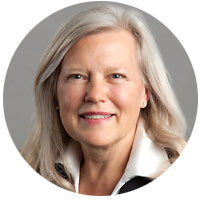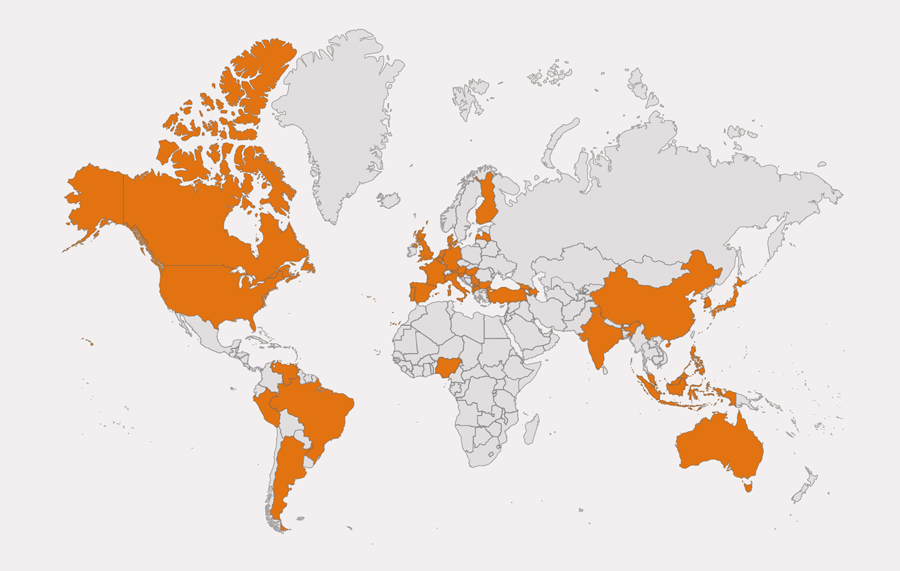Digitisation in Libraries: To What Extent has Corona Given a Boost?
The impact of the corona pandemic has been a huge challenge for libraries, institutes and infrastructures around the world. But to what extent has this crisis also proved to be an accelerator for digitisation in these institutions? We asked eight of them ...
by Susanne Daalsgaard Krag, Aida Maria Ismail, Vasiliki Mole, Rajen Munoo, Christine Okret-Manville, Tamara Pianos, Corey Seeman, Claudia Sittner, Klaus Tochtermann, and Deb Wallace
Together with the partners from the EconBiz network, we set out to find the effects of the corona pandemic on digitisation in (digital infrastructure) institutes, libraries and workplaces around the world. The international EconBiz partner network started in 2012 and has 40 partners in many different countries.
So, how did the institutes from across the globe experience the changes? Are there differences across regions, countries and continents? To find out we asked the partners from the network: What innovation push towards digitisation has the coronavirus triggered in your institution? What was the state of digitisation in your institution at the beginning of the corona pandemic? What was your highlight? What was the biggest challenge? How did you solve it? What was your biggest learning? What is the biggest “life hack” that your institution has taken away from the corona crisis in the area of digitisation?
The result is an exciting wealth of experience from partner institutes from Singapure, France, Germany, the USA, Denmark, Malaysia and Turkey. Thanks to their shared experiences, it becomes possible to look beyond our own corona plates and shows which creative solutions have been found in other parts of the world.
COVID-19 learnings at AU Library / The Royal Danish Library
by Susanne Dalsgaard Krag, Denmark

COVID-19 learnings at AU Library / The Royal Danish Library
by Susanne Dalsgaard Krag, Denmark
COVID-19 came like a thief in the night, and changed all our lives. From one day to another, all the libraries closed down, including The Royal Danish Library. We all needed to find other ways to do things. It has been an exciting voyage and looking back at almost a year of corona pandemic, one can see the results of a true disruption.
Denmark is a highly digitised country. Almost 99% of the population have access to internet connection, which showed to be a very great advantage during the shut downs. At the university libraries we have been preparing for the digital change in quite a while, but in March 2020 we were forced to take a huge step into the digital age, like the rest of the world.
Up to the pandemic we had been training skills in edu-it and virtual meetings, but without the big break through. Now suddenly these skills came into use, and most of the staff are now fully comfortable in online teaching and guidance, and a very big number of digital learning objects have been prepared and published on the homepage. The creativity has been exceptional. We have learned to use the virtual environment to compensate for the social distance, and we can make break out rooms, change virtual background, chat and raise hands in Zoom and Teams. We learned a lot about, what works, and what doesn’t.
The Royal Danish Library has 800 to 900 staff members spread all over the country, and the pandemic has taught us to work together across departments and across the country in a way we would never have imagined. You can mention a lot of different things, we have learned during the pandemic, but I guess this is one of the biggest advantages, and something we will carry into the post pandemic world, which we all look forward to welcome.
More Online Meetings and Events, online-connectedness
and future café at the ZBW
by Klaus Tochtermann, Germany

More Online Meetings and Events, online-connectedness and future café at the ZBW
by Klaus Tochtermann, Germany
Digitisation and digital skills were important topics and working from home was an option for many colleagues at ZBW – Leibniz Information Centre for Economics long before the corona pandemic. Nonetheless, there was still a huge push towards using more digital tools and platforms during the first months of the pandemic. In March 2020, many employees got Zoom-accounts and were able to organise virtual events for up to 300 people. This option was used widely for many different kinds of events. By the end of October, all 270 ZBW-employees were entitled to get WebEx-accounts to organise their own virtual meetings and to use WebEx-Teams for chats etc.
Huge conferences organised by the ZBW were quickly moved to online formats and had even more participants from more countries than in previous years (for example the SWIB – Semantic Web in Libraries, the YES! – Young Economic Summit or the upcoming Open Science Conference).
In order to support social interaction of the employees an internal platform is used to share experiences in dealing with the situation from life-hacks, instructions on keeping your neck-muscles in shape to uplifting thoughts and new hobbies. Since many ZBW-employees mostly worked from home, it was feared that the feeling of connectedness and common purpose might suffer. In order to battle this, the directors launched a 30 minute “future café” which is offered every other week – talking about a specific topic with a question and answers section. Many people from both ZBW-locations in Kiel and Hamburg attend these short meetings – which would be difficult to achieve with on-site-events.
During the first shutdown – when the library was closed for a couple of weeks – students were supported with motivational letters up to five times a week. ZBW services offer special corona-related pages on information access or research or a topic page within the EconBiz Author Profiles.
Since teaching at the universities had to be moved online within a couple of weeks as well, professors asked for support in online instruction methods, so the ZBW organised two online panels and gathered some best practice solutions (German).
The pandemic was and is very challenging for many people but it also opened a number of new opportunities and boosted creative online solutions.
Pandemic Pains Pivots Possibilities at Singapore Management University Libraries
by Rajen Munoo, Singapore

Pandemic Pains Pivots Possibilities at Singapore Management University Libraries
by Rajen Munoo, Singapore
I am currently Head, Learning and Engagement at Singapore Management University Libraries (SMU) – comprising the Li Ka Shing and Kwa Geok Choo Law Libraries. The Libraries serve six schools with an enrolment of around 10,000 undergraduates and postgraduates. Being a city campus where space is prime, SMU Libraries always had a digital first approach where over 90% of our collections and resources are digital. A robust systems infrastructure of various online applications supports the research, teaching and learning needs of the community.
With the onset of the COVID-19 pandemic and the ever-changing directives from various agencies, our priority was collaborating with campus partners in order to comply with the health and safety protocols. To meet this challenge we put in place a business continuity plan that pivoted our digital strategy and also became a catalyst for change.
Our highlights were the various creative ideas implemented by the SMU Libraries team such as:
- pick-up-and-go access service, quickly sourcing e-textbooks and Open Educational Resources (OER) and reaching out to faculty to navigate copyright compliance;
- a knowledge portal of the gratis access to databases provided by vendors during the pandemic;
- redeploying student assistants to extend the virtual “Ask Library” chat service beyond normal library hours to optimise the value-add of library staff and continue to provide work opportunities for students with the physical libraries closure.
Our Library Peer Advisors also stepped forward when the freshmen orientation moved online to curate Online Learning is Different! Succeed in Online Learning a peer-to-peer learning programme that comprised workshops and hacks to help quell the anxiety of new students across the university taking an online semester for the first time!
Stakeholder involvement and communication to ensure no one was left behind, was the biggest learning for the leadership team especially in a service-oriented profession.
Our biggest “life hack” was upskilling – to ensure that all staff were “vaccinated” with digital skills to be resilient and agile by providing them with opportunities to learn, unlearn and relearn through continuing professional development opportunities in this VUCA.
Onward in the spirit of #OneSMULibraries …
COVID-19 and Dauphine-PSL library: Pushing electronic resources
and self-training to the fore
by Christine Okret-Manville, France

COVID-19 and Dauphine-PSL library: Pushing electronic resources and self-training to the fore
by Christine Okret-Manville, France
In the library of Université Paris Dauphine-PSL, we had already gathered a large amount of electronic resources in pre-coronavirus times. But the lockdown forced us to pause and think, to come up with ideas to improve our virtual services.
Our priority has been to extend the size and availability of our electronic collection: we offered remote access to the financial databases which were only available on site, tested new textbook databases and other sources. We dedicated a section of our website to resources publishers could open freely during that time.
To help our readers make the most of all these resources, we put a series of tutorials for self-training online (bilingual). We quickly put up virtual training sessions. We promoted our questions and answers module to maintain contact with our readers. Eventually, through Twitter, Facebook, internal mailing lists and the website, we fed our followers with a regular flow of information.
In this difficult period, we had to show an especially supportive behaviour towards one another to manage adapting quickly to unusual work conditions. Yet it gave us an opportunity to increase and diversify our services, introducing virtuality where we didn’t use it enough or at all yet, and giving us new leads to expand our activity.
Jaws: how Koç University Suna Kıraç Library fought against the pandemic
and managed to hunt the beast down
by Vasiliki Mole, Turkey

Jaws: how Koç University Suna Kıraç Library fought against the pandemic and managed to hunt the beast down
by Vasiliki Mole, Turkey
Koç University (KU) is one of the leading universities in Turkey, distinguished by notable contributions to the elevation of education, knowledge and service both domestically and beyond. Suna Kıraç Library, the main University library embraces and follows closely and consistently the University’s efforts to advance knowledge.
Koç University Suna Kıraç Library has fought COVID-19 investing long working hours and determination to turn the situation into an opportunity to develop distant access solutions for its users. Among the highlights of the previous year are
- the 103 library Instruction sessions we offered,
- the full remote access to e-resources and library services,
- the online international Archives conference in June and the Open Access event in October,
- the monthly online ANAMED Library talks,
- the Virtual Posters session initiative,
- the COVID-19 Koç University Community Archive,
- the Virtual Study Space and
- the online Book Club.
The biggest challenge for us has been to see our efforts and adaptations having a positive result to the community. Sometimes, the comfort zone of years’ old practices is hard to overcome, as it creates a somewhat stiff acceptance of a new perspective. A rather difficult issue we have finally come to a point to change, has been the traditional print textbooks and their replacement with online publications.
Academia brings together the advantage of continuous improvement which benefits all related stakeholders, including the libraries. The current global state dictates that we should always keep our eyes open to new opportunities that will strengthen our profile and consequently will help us accomplish our primary goal: serving our users the best way!
Kresge Library Services and the Great Flip of 2020: Innovation & COVID-19
by Corey Seeman, USA

Kresge Library Services and the Great Flip of 2020: Innovation & COVID-19
by Corey Seeman, USA
Kresge Library Services supports the business information needs of the Ross School of Business at the University of Michigan in Ann Arbor. Back in 2013, we were a fairly traditional business library, with 70,000 volumes, seating for nearly 700 students, and over 100 service hours a week. During a large construction project at the Ross School of Business (2014-2016), the library space for print volumes and student study were removed completely. So we reinvented itselves as a digital only library (or as we call it – the ethereal library). From the time we moved out of our old library space, we were a mostly digital library and (though we did not know it at the time), very well suited for the challenges of a pandemic.
While our collections were virtually all electronic, we had a few in-person services only performed at the library. These included our exam and assignment review and handback service for Ross classes and course material pickup (for printed versions of cases and required readings). In March 2020, with the move to virtual classes, we pivoted easily to meet these new dynamics. We shut down the services that were in-person because there was no way to complete them effectively in a remote fashion.
We developed a number of hacks and changes that will likely be a part of our library from here on out:
- We have long advocated for flexible scheduling, but we were able to expand our coverage by allowing people to work at different times. Giving flexibility to your team can lead to expanded hours of service for your patrons.
- Meetings via Zoom will continue when normalcy returns! Typically, we would try to schedule team meetings for days when everyone can be in the office, but now we can be more flexible.
- Library instruction and consultations via Zoom will likely continue. One of the challenges we would have is finding a space that could work for meetings. By using Zoom, the need for space mostly goes away.
Libraries will have a choice on the other end of this pandemic to keep the changes that have been implemented or revert back to their previous normal ways. The path forward will likely be a combination of these both, but it is important to embrace these changes as a way to a more modern library.
COVID-19 Inspired Innovation at Harvard Business School’s Baker Library
by Deb Wallace, USA

COVID-19 Inspired Innovation at Harvard Business School’s Baker Library
by Deb Wallace, USA
Baker Library sits at the scholastic, physical, and emotional “heart” of the Harvard Business School (HBS) campus. When the decision to move the majority of the School’s activities to online platforms was implemented on March 18, 2020, Baker Library leveraged its decade-long investment in staff capability development, digital collections, semantic search, and a content management/publishing platform to enable continued pursuit of the School’s mission to educate leaders who make a difference in the world.
To meet the research, teaching, and learning needs of our community of students, faculty, alumni, and staff, we repositioned services and created new self-service information products, including components of an internal information portal to enable just-in-time decision-making and the HBS COVID-19 Business Impact Center, an external-facing repository and newsletter that provides the latest research and insights from HBS faculty.
In addition to creating new products, we expanded our virtual reference and digital content delivery services, published 10,000+ digital surrogates of unique materials, and increased access to licensed databases and digital alternatives to print resources. We also created the HBS COVID-19 Community Archive to chronicle the experience and launched a collecting strategy to document this unprecedented time in American business through company records and websites.
As a result, almost every one of our services and information product use volumes have increased. For example, Baker Library website use by MBA students +73% and alumni +43%, database use +76%, Working Knowledge, readership +51%, and Books@Baker participants +90%.
Our greatest challenges are prioritising work, allocating limited resources, and sustaining our teams as they juggled remote work, child and eldercare, and related issues to the growing racial and political strife and healthcare crisis that the US continues to experience. I am indebted to the staff’s commitment to our goals, passion for our work, ingenuity, and entrepreneurial spirit. They are certainly the “secret sauce” of our ability to remain relevant to our community!
Students support SMEs during the COVID-19 pandemic
by Aida Maria Ismail, Malaysia

Students support SMEs during the COVID-19 pandemic
by Aida Maria Ismail, Malaysia
The onset of the COVID-19 pandemic and the enforcement of the Movement Control Order (MCO) in Malaysia resulted in an unprecedented slump in economic activity. Businesses adopted digital measures to make up for the shortfall in traditional sources of revenue. As more business establishments digitalise, firms that are left out of this digital revolution will struggle to survive, let alone thrive. Although the prevailing wisdom is that COVID-19 has ushered in a pivot to digitalisation, there remain many challenges that small and medium enterprises (SMEs) face in doing so. Digitalisation is increasingly useful for SMEs to improve efficiency and competitiveness; despite they perform relatively poorly in digitalisation. Government and policy interventions can facilitate this process, and the university can assist in supporting SMEs digitalisation and survivalist.
The Malaysian education framework direction and way forward addresses the local community needs and issues. Through the ‘Service-Learning Malaysia – University for Society’ (SULAM) which was initiated by the Ministry of Education, students participate in a structured service activity that meets identified community needs. It is a course-based, credit-bearing educational experience. SULAM pedagogy supports humanistic and value-driven education as a key to strengthening the education system by integrating love, happiness and mutual respect.
Four classes of final semester students, Bachelor of Accountancy (Hons) from the Faculty of Accountancy Universiti Teknologi MARA Selangor involved in SULAM, in helping four SMEs’, managing the impact of the pandemic on business sustainability. In order to ensure businesses, remain resilient during this pandemic, students conducted a comprehensive business analysis in order to advise on sustainable strategy and mechanism. Elements of digitalisation were incorporated in the sustainability strategy and mechanism since this will ensure businesses remain competitive. Business model canvases (BMC) and business plans were among the documents prepared by students in helping SMEs getting assistance from the government economic stimulus package. According to the new standard, 90% of the implementation of SULAM took place via a digital platform.
As an advisor to this project, it was a valuable experience since I was able to see how students engage in activities that address community needs together with structured opportunities intentionally designed to promote student learning. It is capable of enhancing the sense of social responsibility, religious and racial tolerance as well as developing skills such as the ability to work well with others, critical thinking skills and creative, leadership and communication skills.
How the corona pandemic has advanced digitisation in libraries
The corona crisis caught us all cold. When suddenly all libraries and institutes more or less closed their on-site services, the first thing to do was to take stock. The result: many institutes had long since made the leap into digitisation or had almost done so. The staff had been trained and had the necessary skills to do their jobs digitally. Now the task was to apply the knowledge they had learned and to improve services that were not yet sufficiently digitalised.
Many libraries created extra websites with corona information and made collections accessible online that were normally only accessible on site. Communication with staff and users took on an important role, which in many places was solved with great personal commitment and creativity. Websites became more dynamic and social media and newsletters were perceived as even more important. The staff was the “secret ingredient” that made so much possible during the pandemic.
To compensate for the lack of social interaction, to keep teams together and motivated, and to keep personal contact with users online, tools such as Zoom or Teams were made available across the board and learned almost overnight.
The group of (often quite young) students was especially supported with a lot of understanding and compassion in the EconBiz partner institutes all over the world, for example with extended chat consultation hours, longer online opening hours or “corona letters” of encouragement. Self-training for a wide range of online and learning skills has been developed and offered to users.
In addition to all the challenges, the crisis was also recognised in many places as an opportunity to make a leap into the possibilities of digitalisation. And even if everyone is longing for a new normality right now, much of what was established and cherished during the corona period will certainly remain part of this new working world.
Note: Originally, another EconBiz partner institution wanted to share their experiences as well. Since they were under a ransomware attack they had more pressing issues than this blogpost. This may happen to any service we provide and shows how fragile digital services can be and that we all have to face many digital challenges in the future. When things work, we sometimes tend to forget.
This might also interest you
- About the international EconBiz partner network
- The Impact of Covid-19 on Research Libraries Across Europe
- Digital libraries and COVID-19, Part 1: responding to a global emergency – Digital Library Perspectives
- Innovation during crisis: exploring reaction of Swedish university libraries to COVID-19
- COVID-19 and digital library services – a case study of a university library
- Silver lining of the COVID-19 crisis for digital libraries in terms of remote access
Susanne Dalsgaard Krag is Library Manager AU Library at The Royal Danish Library at Aarhus University in Denmark. She is the library manager for 7 libraries at Aarhus University, Arts and Business Sciences and is responsible for the university CRIS system and team and a member of the Royal library management team.
Prof Klaus Tochtermann is Director of the ZBW – Leibniz Information Centre for Economics . For many years he has been committed to Open Science on a national and international level. He is a Member of the Board of Directors of the EOSC Association (European Open Science Cloud).
Rajen Munoo has been employed at the Singapore Management University (SMU) Libraries for over 13 years now primarily in the role of working with a team of Research Librarians to design, develop and deliver learning programmes including information literacy classes and workshops for their respective Schools and the wider SMU community. His areas of interest are information and digital literacies, continuing professional development of library and information workers and pedagogy and instructional design.
Christine Okret-Manville has a PhD in History, a degree in Political Science and an Archivist-Palaeographer Diploma (Archive and Library Science). She holds the position of Deputy Director of the Université Paris Dauphine-PSL Library and is also in charge of the library services for researchers, and the management of the university repository BIRD.
Vasiliki Mole is a librarian with a B.A. in Library Science and Information Systems and an M.A. in Cultural Management. She has worked in Academic Libraries, mainly as an Instruction and Reference Librarian focusing on Information Literacy, Outreach and Research support. She is currently serving as the Head Librarian of the Research Center for Anatolian Civilizations (ANAMED) Library.
Corey Seeman (personal website) is the director of Kresge Library Services (Ross School of Business at the University of Michigan, Ann Arbor). Corey has written and presented on customer service and change management within libraries, especially academic ones.
Deb Wallace is the Executive Director of Knowledge and Library Services and is a member of the HBS Senior Leadership Team. She manages a team of library, archival, technical, and research professionals in providing innovative products and services to meet the needs of the HBS and Harvard University communities.
Aida Maria Ismail PhD is Senior lecturer at the Faculty of Accountancy, University Teknologi MARA (UiTM), Selangor Malaysia. Her responsibility covers from teaching & learning activities, supervising research students, conducting research, publication and consultancy. Her area of expertise is ethics, governance and sustainability.
Dr Tamara Pianos studied Geography and English literature. After completing her doctorate in Canadian Studies and a traineeship as an academic librarian she worked at the TIB in Hanover. Since 2005, she has been working at the ZBW – Leibniz Information Centre for Economics, where she is now head of Information Provision and Access. She is the product manager of the EconBiz portal and is responsible for information literacy topics.
Claudia Sittner studied journalism and languages in Hamburg and London. She was a long time lecturer at the ZBW publication Wirtschaftsdienst – a journal for economic policy, and is now the managing editor of the blog ZBW MediaTalk. Part time she works as a freelance travel blogger, speaker and author.
References Portraits:
Susanne Dalsgaard Krag© | Klaus Tochtermann: Sven Wied/ZBW© | Rajen Munoo© | Christine Okret-Manville: Patrick Dardinier© | Vasiliki Mole© | Corey Seeman: Bob Hebert/Wake Forest University Library© | Deb Wallace© | Aida Maria Ismail©.
Open Science Podcasts: 7 + 3 Tips for Your Ears
Podcasts were among the media winners of last year. Scientific podcasts in particular...

